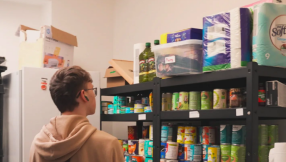Humanitarian Crisis in Sri Lanka as War Set to Continue
President Mahinda Rajapaksa's government has vowed to hold local government elections in the east by the year-end and officials say they will then try to win hearts and minds by rapidly developing the impoverished region.
After losing its grip in the east, the Tigers say they now will attack major economic and military targets in a bid to cripple the $23 billion economy and restore what they call the balance of power.
With the focus shifting to the north, tens of thousands more civilians have been forced to flee homes, swelling the hundreds of thousands already displaced across the island by the conflict.
The military last week said it had captured the jungle area of Thoppigala after months of fighting, leaving the Liberation Tigers of Tamil Eelam (LTTE) without any eastern territory for the first time since the 1990s.
"But it doesn't feel as if it's over," said one Western aid worker. "Quite the opposite, in fact."
The Tigers still hold territory in the north that they run as a de facto state and where they have effectively been besieging the government-held northern Jaffna peninsula since August.
"The government has gained territory militarily but the rebel military machine is still intact," said Jane's defence analyst Iqbal Athas. "What the LTTE did was offer resistance and then withdraw."
The military is blocking shipments of cement, steel, fuel and other items from reaching Tiger territory, forcing aid groups to shelve post-tsunami housing projects as well as plans to build schools and hospitals.
But essential supplies are reaching most of those in need, at least for now.
WAR SEEN ESCALATING
Experts believe the military could now make a push to capture the northern rebel stronghold, after Rajapaksa vowed to "restore democracy to the East and all Sri Lanka".
That would make aid access both to Jaffna -- where supplies are already short -- and the rebel-held Vanni, even more difficult.
What no one expects is new peace talks. The rebels have ruled out peace while Rajapaksa is in office.
The government says it is willing to talk but has also warned it wants the rebels' military assets, which include fleets of Sea Tiger attack boats and light aircraft, destroyed.
"The government has accelerated its military offensives, so to put an end to it, we have to target economic targets," Tiger political wing leader S.P. Thamilselvan told Reuters in an interview last week.
"After closing all the avenues for the other party to participate in meaningful negotiations, the government inviting (us) to attend talks is meaningless," he added.
An estimated 4,500 people have died since last year, pushing the death toll from the two-decade-old war to around 70,000. Rights groups blame both sides for disappearances and killings that began in the north and east then spread to Colombo.
In the east, many of the displaced have been able to return home -- although aid workers fear some may have been sent back against their will. However many have not and others continue to move, citing local insecurity and fears of armed groups.
Tamil residents have been stopped from returning to what used to be the rebel stronghold of Sampur near the strategic northeastern port of Trincomalee as the area, from which the Tigers last year attacked naval shipping, has been declared a high security zone for the military.
"The residents are still stuck in camps," said one Western aid worker. "The fear is that it could eventually amount to ethnic cleansing."













